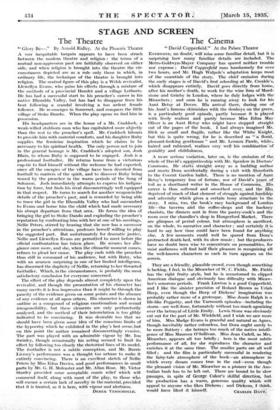STAGE AND SCREEN The Theatre
" Glory Be—." By Arnold Ridley. At the Phoenix Theatre A NOT inequitable bargain appears to have been struck between the modern theatre and religion : the terms of a mutual non-aggression pact are faithfully observed on either side, and when religion is brought into the theatre the cir- cumstances depicted are as a rule only those in which, in ordinary life, the technique of the theatre is brought into religion. The central figure of this play is a Welsh revivalist, Llewellyn Evans, who gains his effects through a mixture of the methods of a provincial Hamlet and a village Lothario. Ile has had a successful start to his preacher's career in his native Rhondda Valley, but has had to disappear from his beat following a scandal involving a too ardent female follower. He re-emerges in Somerset, and conquers the little village of Stoke Dando. When the play opens we find him in possession.
His headquarters are in the house of a Mr. Craddock, a weak-willed stubborn man who has capitulated more abjectly than the rest to the preacher's spell. Mr. Craddock labours to provide him with material comforts, and his daughter Ruby supplies the feminine inspiration which he claims to be necessary to his spiritual health. The only person not to join in the general homage is Mr. Craddock's adopted son, Josh Blain, to whom Ruby is supposed to be engaged. Josh is a professional footballer. He returns home from a victorious cup-tie to find himself without the welcome he had expected, since all the energies of the village have been diverted from football to matters of the spirit, and to discover Ruby being wooed by the preacher in the warm periods of the Song of Solomon. Josh immediately attempts to express his indigna- tion by force, but finds his rival disconcertingly well equipped in that respect. He turns to search for another weapon in the details of the preacher's past, and is rewarded by being able to trace the girl in the Rhondda Valley who had succumbed to Evans and borne him the child which had made necessary his abrupt departure from that area. He forms the idea of bringing the girl to Stoke DandO and exploding the preacher's reputation by confrOnting him with her at one of his meetings.. Nellie Peters, stirred by hearing that she now has a successor in the preacher's attentions, professes herself willing to play the suggested part. But unfortunately for dramatic justice, Nellie and Llewellyn Evans are permitted to meet before the official confrontation has taken place. He secures her alle- giance once More, and she, when the climactic moment conies, refuses to plead her cause. The play ends with the preacher thus still in' command of his audience, but with Ruby, who with an acumen surprising in one of her limited intelligence, has discerned the duplicity of Nellie, returning to her thwarted, footballer. Which, in the circumstances, is probably the most satisfactory conclusion for everyone concerned.
The effect of the play depends almost completely upon the revivalist, and though the presentation of his character his many merits it is less impressive than it might be through the paucity of the evidence given on some points and the absence of any evidence at all upon others. His character is shown in outline as a compound of religious emotionalism and sexual irresponsibility, but these elements are only perfunctorily analysed, and the method of their 'interrelation is too glibly indicated to be convincing. It was desirable too that we should have been given some idea of the conscious limits of the hypocrisy which he exhibited in the play's last scene, but on this point the author remained disconcertingly evasive. The part was played with an admirable vigour by Mr. Ion Swinley, though occasionally his acting seemed to limit its effect by following too closely the rhetcirical lines of its model. The footballer is not a subtle conception, and Mr. Barrie Livesey's performance was a thought too urbane to make it entirely convincing. There is an excellent sketch of Nellie Peters by Miss Edna Davies, and good performances in small parts by Mr. G. H. Muleaster and Mr. Allan Rose. Mr. Victor Stanley provided some acceptable comic relief which will commend itself, along with most of the play, to those who will excuse a certain lack of novelty-in the Material, provided that it is treated, as it is here, with vigour and alertness.
DEREK VERSCHOYLE.










































 Previous page
Previous page